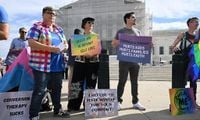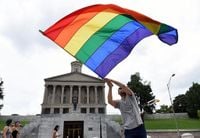As the U.S. Supreme Court embarks on its 2025-2026 term, the nation finds itself at a pivotal crossroads on LGBTQ+ rights, with a series of high-profile cases poised to shape the legal landscape for years to come. At the heart of the debate is a challenge to Colorado’s ban on so-called "conversion therapy" for minors—a practice roundly condemned by medical professionals but defended by some religious groups as a matter of free speech and faith.
On October 7, 2025, the justices heard arguments in the case brought by Kaley Chiles, a Christian counselor backed by the conservative legal advocacy group Alliance Defending Freedom. Chiles contends that Colorado’s 2019 law, which prohibits licensed therapists from engaging in conversion therapy with minors, violates her First Amendment rights. The law, she argues, wrongly bars her from offering voluntary, faith-based counseling to children and teens grappling with questions of sexual orientation or gender identity.
"Ms. Chiles is being silenced, and the kids and families who want her help are unable to access it," said her attorney James Campbell, as quoted by the Associated Press. The stakes are high: violating Colorado’s law carries potential fines of $5,000 and the threat of license suspension or even revocation. Yet, as Chiles’ legal team emphasizes, the law exempts religious ministries and allows for faith-based conversations—raising tough questions about where the line between professional regulation and religious liberty should be drawn.
According to CNN’s Supreme Court correspondent John Fritze, the 90-minute hearing was "surprisingly low-key and short," but it quickly became clear that several justices were skeptical of the state’s position. Chief Justice John Roberts pointed to precedent, noting, "Just because they’re engaged in conduct doesn’t mean that their words aren’t protected." The conservative majority seemed particularly troubled by what Justice Samuel Alito described as "blatant viewpoint discrimination"—the idea that Colorado’s law restricts talk therapy aimed at changing sexual orientation or gender identity while allowing counseling that affirms LGBTQ+ identities.
For Colorado, the argument is straightforward: therapy is health care, and the state has a duty to regulate practices deemed harmful by the medical community. The law, state attorneys argue, is not a blanket ban on religious expression but a targeted measure to protect vulnerable youth from a practice that has been "scientifically discredited and linked to serious harm." As Colorado Solicitor General Shannon Stevenson put it, "Providers have a duty to act in their patients’ best interest and according to their professional standards. The First Amendment affords no exception." No therapist has yet been sanctioned under the law, but its presence on the books is seen as a necessary safeguard.
The medical consensus is unambiguous. As reported by LGBTQ Nation, "conversion therapy has been debunked by every single reputable, relevant medical organization; there is no evidence that it is effective, and even more, it often leads to lifelong psychological harm, such as increased risk of self-harm and suicide." More than 20 states have enacted similar bans, reflecting a widespread belief that the risks far outweigh any purported benefits.
Yet, the Supreme Court’s consideration of the case comes amid a broader reckoning over the limits of state power, religious freedom, and the rights of LGBTQ+ Americans. The justices’ questions touched on the potential for "viewpoint discrimination" and whether the same rationale used to ban conversion therapy today could have been wielded in the past to suppress counseling that affirmed homosexuality, when mainstream medical views were less accepting. As Justice Neil Gorsuch mused, "What if a state back then might have passed a law prohibiting talk therapy that affirmed homosexuality?"
Justice Amy Coney Barrett floated the possibility that a higher legal standard—strict scrutiny—might apply, but also suggested that malpractice lawsuits could address claims of harm without sweeping bans. Meanwhile, Justice Ketanji Brown Jackson questioned why the Colorado law should be struck down while the Court upheld a Tennessee law banning transition-related medical treatments for transgender minors, probing for "equivalence with respect to these things." The Justice Department, for its part, argued that the Tennessee law concerns medical procedures, not speech, and is thus fundamentally different from Colorado’s regulation of talk therapy.
The implications of the case extend well beyond Colorado. As the Associated Press notes, the 10th U.S. Circuit Court of Appeals in Denver upheld the state’s law, but the 11th Circuit struck down similar bans in Florida, creating a legal patchwork across the country. Other states, like Wisconsin and Virginia, have seen their own bans challenged or scaled back, reflecting ongoing legal wrangling over how best to protect minors while respecting constitutional rights.
For families who have experienced conversion therapy firsthand, the stakes are deeply personal. Linda Robertson, a Christian mother from Washington state, described the devastating impact of such therapy on her son Ryan, who underwent counseling that promised to change his sexual orientation. "What happened in conversion therapy, it devastated Ryan’s bond with me and my husband," she told the Associated Press. "And it absolutely destroyed his confidence he could ever be loved or accepted by God." Ryan died in 2009, after multiple suicide attempts and a drug overdose at age 20—a tragedy his mother attributes, in part, to the therapy he received.
Chiles’ case is just one front in a larger legal battle over LGBTQ+ rights this Supreme Court term. As reported by LGBTQ Nation, the justices are also weighing cases involving transgender athletes’ participation in sports and the ability of transgender, nonbinary, and intersex Americans to obtain identification documents that reflect their gender identity. These cases, together, "may determine the vitality of trans rights in the U.S. for generations to come." The court’s decisions could affect everything from access to health care and sports participation to the fundamental right to travel and vote.
As the nation awaits a ruling—expected by June 2026—the outcome could reverberate far beyond the courtroom. A decision in favor of Chiles might open the door for more providers to offer conversion therapy under the guise of religious freedom, potentially expanding the scope of religious exemptions in health care and beyond. Conversely, upholding Colorado’s ban could affirm the state’s authority to regulate harmful practices, even when they intersect with matters of faith and speech.
With so much at stake, all eyes are on the Supreme Court as it navigates the delicate balance between protecting vulnerable youth, respecting religious liberty, and upholding the constitutional principles that define American life.



